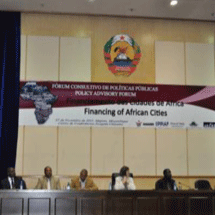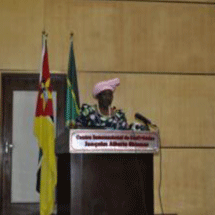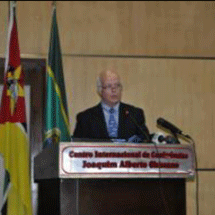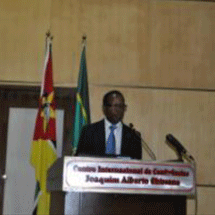[7 November 2011] – With rising urbanisation and the pressing need to ramp up the provision of basic services and infrastructure development, what are the financing options open to mayors and city officials in Africa to enable them stay the course of ensuring improved city life for all? More so when faced with shrinking national budgets, weak internal revenue bases and constraints on many donors?
These and other emergent issues of financing of African cities took centre stage at a highly successful Policy Advisory Forum, which took place in the rapidly growing city of Maputo, the “city of acacias”.
Designed to showcase the strengthened partnership framework of the new Cities Alliance, the Forum was co-hosted by the Alliance and the Public Private Infrastructure Advisory Facility (PPIAF), in collaboration with the Municipality of Maputo, the Associação Nacional dos Municípios de Moçambique (ANAMM), and Agence Française de Développement (AfD).

From left: Emmanuel Becape of the Municipality of Beira; Rogerio Gaspar, Mayor of Mocuba; Chale Ossufo, Mayor of Nacala; Clare Short, Chair, Cities Alliance PAF; and Mayor of Nampua Castro Safinas Manuaca listen to the address by Dioniso Cherewa, Secretary General of ANAMM (not shown).
More than 200 people participated at the Forum with a broad representation of national and municipal government officials, community groups and donor community all working on urban issues in Mozambique.
Formally opened by the Mozambican Minister of State Administration, Ms. Carmelita Rita Namashulua, the Forum offered Cities Alliance members and partners a platform for the sharing of knowledge and experiences on the critical issue of financing for cities.
Opening ceremonies, emceed by Councilor Louis Nhaca of the Municipality of Maputo, saw speeches by the partners all invariably reaffirming the value-add of partnership and its significance to the addressing Mozambique’s urbanisation issues.

Mozambican Minister of State Carmelita Rita Namashul
The Minister expressed her appreciation of Mozambique being chosen as the Cities Alliance’s fifth country programme, adding that the longer term nature of the country programme design provides the opportunity for the country to more efficiently address its urbanisation challenges. Underscoring the importance of the theme of the Forum she agreed on the need for tools that can be used to support the financing of urban services and investments.
David Simango, President of the Maputo Municipal Council, provided some fast facts about the city of acacias itself and spoke of a vision of an inclusive Maputo city with fewer informal settlements, better urban infrastructure and the extension of the network of urban services.
Financing Urban Investments – The Imperative of Partnerships
n response, Billy Cobbett, Cities Alliance Manager and co-host, thanked the city for incorporating the Policy Advisory Forum within the activities marking the 124th anniversary of the founding of Maputo city.

Cities Alliance Manager William Cobbet
Cities Alliance has been active in Mozambique since 2002 (Read a factsheet on the Cities Alliance in Mozambique) and the relationship stands to be strengthened in the coming months and years with the design and elaboration of the Mozambique Country Programme.
Cobbett also highlighted the opportunities inherent in the new collaboration between Cities Alliance and PPIAF to provide more effective support to cities in Africa.
Responding in Portuguese Adriana de Aguinaga de Vellutini, Programme Manager for both PPIAF and Global Program for Output Based Aid (GPOBA), stressed that public private participation in infrastructure investment is one sustainable avenue to addressing shortfalls in the provision of infrastructure services in cities in developing countries.
She elaborated on the kinds of support PPIAF can provide to cities in Africa, including institutional capacity building to enhance public private section partnerships, financing infrastructure development strategies, technical assistance grant funds to help prepare projects and establish and environment conducive to PPP transactions and direct support of sub-national entities access to private financing such as municipal bonds.
Like Cities Alliance, PPIAF and GPOBA have also been active in Mozambique for some time. Later on during the Forum, Aguinaga de Vellutini cited specific case studies and urged mayors and city officials to access financing provided by these two organisations.
Morning and afternoon panels on specific sub-themes of the main theme were efficiently moderated by the Chair for the Cities Alliance Policy Advisory Forum, Clare Short. She provided the context for the ensuing discussions by painting the broad picture of the challenges and opportunities of urbanisation in Africa, with special focus on Cities Alliance’s new directions as captured in the new Charter and by the Country programmes in response. She spoke in particular of the need to harness the energy and enterprise of slum dwellers to impact cities’ economic growth and national development.
Following her remarks Zoubida Allaoua, World Bank Group Director of Finance, Economics and Urban Development (FEU), described the forum as an important platform for deliberating on how cities can best deliver services to their citizens to ensure their sustainability. Local authorities also need to ramp up their efforts to mobilise private financing and pointed to the partnership leveraged between three global programmes in her department – Cities Alliance, PPIAF and GPOBA – as an example of more coherent development assistance.
Financing Urban Investments – the Imperative of Local Investments
|
Fast Facts on Urbanisation in Mozambique -- Area: 799.380 km2 -- Population (2011): 23 million -- Annual Population Growth: 2.3 percent -- Urban Population Growth (2005 – 2010): 4.1 percent per year -- Poverty Rate (2008): 54.4 percent -- GDP 2010: USD 9.59 million -- Economic Growth: 7.2 percent per year -- Urban Population: Currently 36 per cent; by 2030, 60 per cent -- No. of Municipalities: 43, comprising 23 cities and 20 villages. Municipalities are often a mix of urban, peri-urban and rural. Expenditure of $3 – $20 per capita per annum -- Population of Maputo: 1.2 million. 75 percent of Maputo’s population, approximately 800,000 people, live in informal settlements without adequate infrastructure and urban services. |
The keynote address was delivered by Thierry Paulais, formerly on secondment to Cities Alliance but now back to AfD, sharing key messages and lessons from his seminal work Financing Africa’s Cities – The Imperative of Local Investments. Dr. Paulais spoke of the absolute need for a shift in paradigms as well as scale in response to the financing crisis in local governments. This shift is urgent due to the following:
-- Following decades of underinvestment, the situation in cities has actually degraded;
-- Real decentralisation probably not progressing;
-- Underestimation o f the urban challenge;
-- $25 billion per year needed for local investments;
-- Investment capacities by Local Governments: $ 10 billion per 10 years;
-- Lack of operators in land development;
-- Present “business as usual” trend not sustainable;
-- Economic consequences underestimated; and
-- Improve the productivity of cities.
In response he advances a number of approaches including the strengthening of local governments, encouraging endogenous financing, bolstering of financing tools, modernisation of financing systems, leveraging capital markets, mobilising credit institutions and the institution of a regulatory framework for sub-sovereign debt.
Other financing options available to cities include financing through land value capture and land development, where the city finances the city; increasing fiscal resources and activities such as leveraging housing property taxes and boosting housing and construction.
He also discussed a “Special Initiative for fragile cities”, necessary because fragile states account for one-third or half of all African countries. Further, there is the growing risk of an Africa divided along the lines of pre-emerging countries versus fragile states or cities. Fragile cities find themselves often find themselves in a double trap: that of poverty and of financing, with some being caught in a vicious circle for decades.
To support these fragile cities the Special Initiative, comprising multi-partners (donors, foundations and the private sector), African sovereign funds would provide grants and support structural changes, leverage the often very dynamic local private sector and provide safety nets and workers welfare programmes.
Reinforcing the necessity of empowering local governments to take charge of their financing needs through fiscal decentralisation Dr. Francois Yatta of United Cities and Local Governments (UCLG) argued that local governments have a significant share in the implementation of public expenditures. The world average for public expenditure disbursed by local governments is 25 per cent.
Through stronger fiscal decentralisation African local governments should be able to attain this average within a time span of 10 to 15 years. They must however have, at their disposal precise indicators enabling them to more accurately estimate their share of the public expenditure and to follow its evolution, in addition to sourcing and sharing sound knowledge of local fiscal potential and of the best way of mobilising it.
Financing Urban Investments – the Experience of Mozambique and Uganda
The two presentations framed the panel discussion on the Mozambican and Ugandan experiences of financing cities. Describing how ANAMM works Mr. Dioniso Cherewa, Secretary General of the Association spoke of the need for its 43 municipalities to work to promote exchanges of knowledge and programmes on financing. Mayors Rogerio Gaspar and Castro Safins Manuaca of Mocuba and Nampula respectively shared overviews of their respective cities’ experiences in addressing their urbanisation challenges.
Their colleague from Nacala, Mr. Chale Ossufo, honed in on the role cadastral system as the foundation for all integrated intervention in his city, while Emmanuel Becape from the Municipality of Beira said scarce resources available to city officials mandates judicious management and effective governance.
The theme of efficient management of urban investments and the central role of city managers was taken up by Roland Hunter, former city manager for Johannesburg and now of the South African Cities Network (SACN). He drew on a study he had prepared on the State of Municipal Finance in Southern Africa to deliver these strong messages:
-- Cities need to be governed by strong city governments.
-- City governments need to dramatically improve their own performance, especially on revenue generation and on investing.
-- All city governments can improve through city finance strategies, internal and external reform initiatives.
-- City leadership is key – city leadership of stature and maturity, a dedicated management team, political and administrative insight and courage
The Uganda country programme experience in relation to the theme of the Forum generated the most interest and discussion. It provided stakeholders in the emerging Mozambique country programme an insight into the evolution of the mechanism and the early results and impact for urbanisation in Uganda.
Samuel Mabala, Commissioner for Urban Development in the Ugandan Ministry of Lands, Housing and Urban Development (MoLHUD), elaborated the Transforming Settlements of the Urban Poor in Uganda (TSUPU) programme, the context for its design as well as its ongoing rollout in five secondary cities in Uganda.

Samuel Mabala, Commissioner for Urban Development in Uganda's Ministry of Lands, Housing and Urban Development
The overarching goal of TSUPU is to create inclusive cities without slums in Uganda in order to maximise the potential of urbanisation by proactively managing urban growth.
Key objectives are: to support the formulation of relevant urban development policies and strategies; to improve living conditions of slum dwellers through increased access to basic municipal social, economic and infrastructural services; to promote community empowerment through municipal wide forums, awareness and skills training programmes; and to increase public awareness on appropriate urban development and management information.
Outcomes so far are tangible and have greatly impacted urbanisation in Uganda. Not only is the entire programme being driven by the Ugandan government and citizenry, including being given local names in the different secondary cities where it is being played out, it is leading to important results:
-- An empowered urban citizenry
-- Improved access by the citizenry to services
-- The development of national urban development policies
-- Investment alignment – the Ugandan support to municipal infrastructure development is being funded by the World Bank to the tune of $130 million.
A secondary city perspective on TSUPU was provided by the Town Clerk for the city of Mbale, Mr. Mafabi Mutwalibi Zandya, who outlined some of the more specific results of the programme in his city, including the formation of Community savings groups where more than 5,000 members have joined and saving regularly; the conduct of Household enumeration, profiling and mapping; the election of their leaders; their lobbying and negotiation for access to opportunities and the stronger participation of the citizens in their own improvement programmes.
The potential for country programmes to greatly enhance investment opportunities that benefit slum dwellers was highlighted by Sheela Patel, Director, Shack/Slum Dwellers International (SDI) who shared lessons from the broad swathe of community groups and municipal partnerships in India, Africa and Latin America to reinforce the significance of financing city investments that serve the need of the urban poor.




